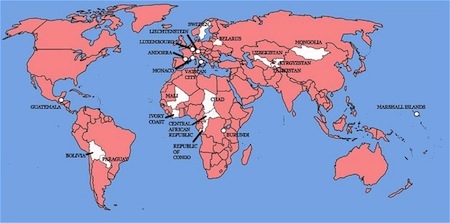The state of the race
Of course, tomorrow’s election, in what’s still arguably the world’s most powerful country, will have huge implications for world politics — U.S. foreign policy obviously runs from the occupant of the Oval Office (more so than domestic policy), and with U.S. secretary of state Hillary Clinton stepping down in either case, the election result will determine the next top U.S. diplomat. So it seemed natural to pull together some brief thoughts for Suffragio on election eve.
Nate Silver’s final post at FiveThirtyEight before tomorrow’s U.S. general election gives incumbent Barack Obama (pictured above, below with vice president Joe Biden at left) a 92.2% chance of winning. I’m not so sure, but InTrade has Obama with 67.2% odds of winning. National polls are essentially tied, with some giving either Obama a narrow edge or his challenger, former Massachusetts governor Mitt Romney (pictured below), a slight edge. State polls in swing states give Obama slight edges — the winner must win 270 out of 528 electoral votes (i.e., the presidential election is essentially 50 separate state contests — each state has a number of electoral votes ranging from three (the smallest states) to 55 (California).
Most notably of all, go read Foreign Policy‘s compendium of its best 2012 U.S. presidential election coverage, which is stellar as usual.
In terms of coverage, I’ll list favorite / obligatory pundits below:
- Follow Slate‘s Dave Weigel here.
- Follow Time‘s Mark Halperin here.
- Follow National Review‘s The Corner here.
- Follow Andrew Sullivan’s Daily Dish blog here.
- Follow Matt Drudge here.
- Follow Chris Cillizza’s Washington Post blog here.
- Follow Ezra Klein’s policy blog at the Washington Post here.
Don’t forget Puerto Rico elections
Although it’s a U.S. commonwealth, Puerto Rico will also go to the polls to select a governor, where incumbent Luis Fortuño (a Republican supporter) of the pro-statehood Partido Nuevo Progresista de Puerto Rico (the PNP, New Progressive Party of Puerto Rico) narrowly leads Alejandro García Padilla of the pro-commonwealth/status quo Partido Popular Democrático de Puerto Rico (the PPD, Popular Democratic Party of Puerto Rico). Fortuño has cut Puerto Rico’s budget since taking office in 2009 and has nearly brought the island from deficit to surplus. Nonetheless, economic growth has been elusive and while the unemployment rate has fallen, it’s still around 15%. If Fortuño loses his race, but Romney wins, there’s a strong chance that Fortuño could be asked to take a position — or even a Cabinet-level post — in a Romney administration.
Puerto Rico will also hold yet another referendum on statehood in two parts: whether they are satisfied with Puerto Rico’s current status as a ‘commonwealth,’ and if not, whether they would prefer U.S. statehood, full independence or a confusing ‘sovereign associated state’ status.
With four million people, if Puerto Rico were independent, it would be the fourth-most populous country in the Caribbean, after Cuba, Haiti and the Dominican Republic.
Predictions
So now on to my own prediction.
We know the outcome of most states. Obama will almost certainly win California, New York (29 electoral votes), Illinois (20 electoral votes), New Jersey (14 electoral votes), Washington (12 electoral votes) and Romney’s Massachusetts (11 electoral votes), among others, and he is leading in Pennsylvania (20 electoral votes) and Michigan (16 electoral votes), both of which voted for Al Gore in 2000 and John Kerry in 2004, despite their loss in the wider Electoral College.
Romney will almost certainly win Texas (38 electoral votes), Georgia (16 electoral votes), and a swath of smaller states in the Old Confederacy South, the Great Plains states, and much of the Mountain West states.
The actual popular vote tally of all 50 states doesn’t matter, so I will whiff and say it’s too close to call — Hurricane Sandy may well depress voter turnout in Delaware, New Jersey and New York, but those states are solidly in favor of Obama.
For the electoral vote, my final prediction is Obama 276, Romney 262: Continue reading Final thoughts (and predictions) for the U.S. presidential election



